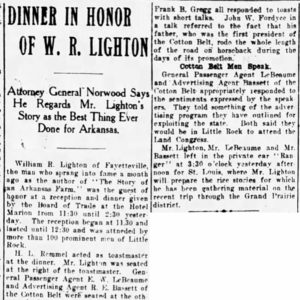calsfoundation@cals.org
Will Lighton (1866–1923)
aka: William Rheem Lighton
In 1908, writer William Rheem (Will) Lighton bought land in Fayetteville (Washington County), named it Happy Hollow Farm, and used “scientific agriculture” ideas to turn it into a successful farm. Even more successful was an article, “The Story of an Arkansas Farm,” which was published in the Saturday Evening Post on January 22, 1910. The article resulted in a stream of curious visitors. By the time it was expanded into a book, Happy Hollow Farm (1914), it had attracted more than 200 back-to-the-land settlers to Fayetteville.
Will Lighton was born on July 13, 1866, in Lycoming County, Pennsylvania, the son of William and Lydia Rheem Lighton. He married Laura McMaken on April 8, 1890, in Atchison, Kansas, set up their home in Nebraska, and fathered three daughters and a son.
By the early 1900s, Lighton was an established writer. He reported on the 1906 San Francisco earthquake for the Boston Evening Transcript, sold stories steadily to magazines, and wrote a few novels, usually romances of rural life, westerns, and historical pieces, which were for the most part serialized in magazines. Many of his stories featured “Billy Fortune,” a character based on his wife’s cousin, a Wyoming homesteader.
It had been Will and Laura Lighton’s dream to have a small farm. A “farms for sale” advertisement from a Fayetteville real estate agent, plus the knowledge that a university was there, brought the Lightons to Fayetteville. They found a run-down, neglected farm they could afford, and Lighton used advice from the College of Agriculture at the University of Arkansas (UA) in Fayetteville to turn it into a money-making farm, although he continued writing. In 1910 and 1911, he edited a magazine, Back to the Land, printed in Fort Smith (Sebastian County), featuring articles by Lighton and others.
With the start of World War I, Lighton’s Billy Fortune stories declined in popularity, but the new business of movies beckoned. One of Will Rogers’s first movies featured the Billy Fortune character, and Lighton moved to Hollywood with his family, hoping to become a screenwriter. Will Rogers remained a friend of the family as long as he lived. Although Lighton had little success, son Louis D. “Bud” married scriptwriter Hope Loring and eventually became a successful producer. Lighton was preparing to return to Fayetteville when he sickened and died on January 25, 1923. He was cremated and his ashes scattered in the Pacific.
The Happy Hollow Farm house was added to the National Register of Historic Places in 1986.
For additional information:
Lighton Family Papers. Special Collections. University of Arkansas Libraries, Fayetteville, Arkansas.
“William R. Lighton’s Happy Hollow Farm.” Flashback 18 (August 1968): 5–7.
Nan Lawler
Fayetteville, Arkansas
 Will Lighton Article
Will Lighton Article 




Comments
No comments on this entry yet.